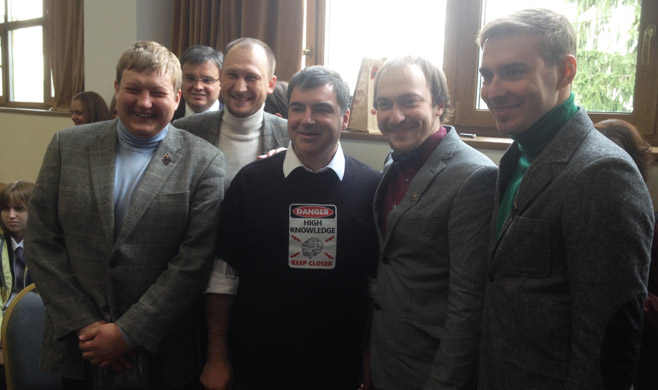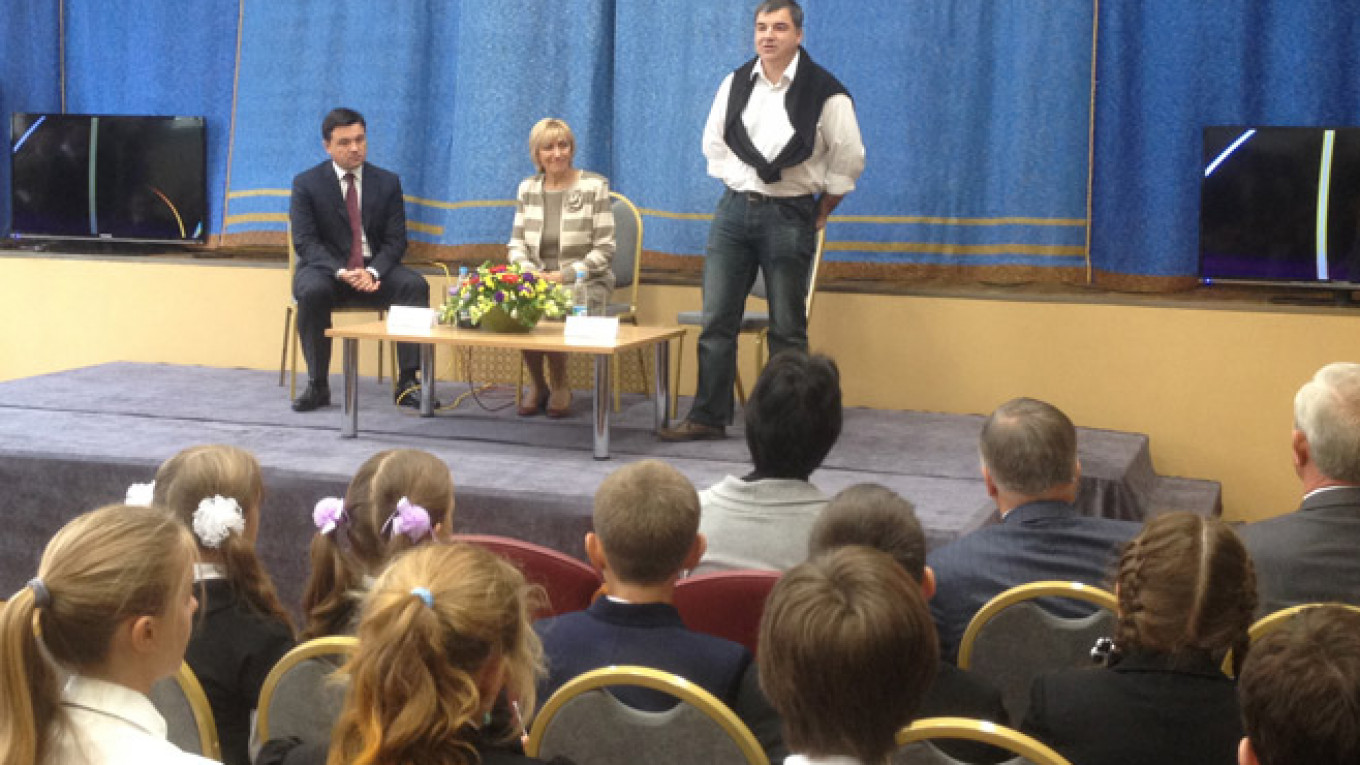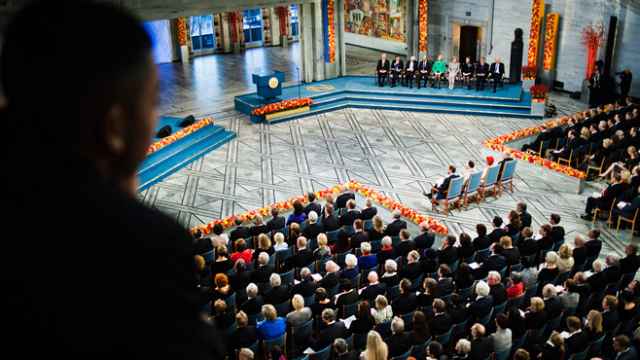Russia missed out on the Nobel Prize in Physics this week, despite some solid contenders. But two Russian-born scientists won as recently as 2010, bringing the nation its third Nobel Prize in its post-Soviet history.
Konstantin "Kostya" Novoselov and his senior colleague Andre Geim shared the prize in 2010 for their pioneering work on a material called graphene, which has the potential to revolutionize fields as diverse as medicine and the Internet, and even, possibly, prevent wars — or so the Nobel committee hopes.
Their research, which dates back to 2004, is encouraging proof that Russian fundamental science, once powerful but now flagging amid underfunding and ham-fisted commercialization, is still capable of producing top-notch researchers.
"The best moments in life are when you come home from work and realize you've learned something new," Novoselov said in a rare public appearance in Russia last month, speaking in true scientific spirit.
The duo, however, are based in Manchester, hold British citizenships and knighthoods and have no intention of coming back to Russia — as clear an indication as any that there is something wrong with domestic science.
2D Crystal and Its Uses
Geim and Novoselov made graphene using simple Scotch tape, with which they peeled one-atom-thick slices of graphite off pencil lines drawn on paper.
The product was extraordinary: The resulting two-dimensional structure gave the crystalline graphite material unique properties, among them a breaking strength 100 times that of steel, and incredible heat and electrical conductivity.
This means the uses of graphene are, theoretically, near-limitless. Medics, for example, are considering its application to restore nerve cells in living tissues — which could make possible walking again after a spinal injury.
The way graphene handles electrons makes it a potential foundation for a revolution in data transmission — Georgia Tech University said last year graphene-based Wi-Fi devices could have upload speeds of a terabyte a second, which is more traffic than most users currently generate in a year.
It could also charge and store vast amounts of energy in minutes — so no more checking the battery life on your smartphone.
The smartphone itself could become bendable — and not in a bad way like those reports about the iPhone 6: Graphene coating could see glass gadget screens replaced with bendable plastics.
Perhaps most important — at least outside the developed world — is the material's application in the cheap desalinization of salt water. Shortages of drinkable water are often forecast to be the main cause of global conflict in the 21st century. As populations in water-hungry Africa, India and China rise, graphene filters could avert much global tension, or even war.
But these bright prospects have yet to materialize: The global market for graphene was estimated by the Research and Markets agency in 2013 at $12.5 million a year — less than what Apple makes every day on its latest gadgetry.
Skeptical voices have pointed out that graphene may yet go down the path of high-temperature superconductors — materials that also promised a new golden age for electronics if only they could be made to work at room temperature. Research in that field has been ongoing for 30 years, but so far, success is evasive, and their application remains much more limited than enthusiasts hoped.
But work on the practical applications of graphene is only just beginning — with 1 billion euros ($1.2 billion) allotted for research in the field by the European Commission last year. And in any case, Geim and Novoselov were awarded the Nobel Prize for describing the material's properties, not applying it to smartphones or water filters.
Graphene, finally, can be art. An exhibition will open later this month in Manchester based around tiny strips of graphene obtained from artworks, including by Romantic-era British visionary William Blake, and a letter by Ernest Rutherford, the father of nuclear physics.
According to the BBC, the graphene will be installed into a humidity-triggered sensor that Novoselov will breathe into on the show's opening night, unleashing a firework show made to look like a meteor shower.
A Knight From Nizhny Tagil
Novoselov, 40, hails from Nizhny Tagil, a city of 350,000 in the Urals that is primarily known for a mammoth tank building facility and, recently, a politically incorrect stereotype presenting it as the capital of rowdy and chauvinistic blue-collar workers.
However, Novoselov, who comes from a family of school teachers, defied whatever stereotypes were out to get him from an early age, participating in numerous nationwide physics competitions.
He also studied by mail in the preparatory school for the Moscow Institute of Physics and Technology, aka the Phystech, Russia's leading physics college, into which he eventually enrolled in 1991 — ironically, after flunking the entry exam for the Nizhny Tagil Polytechnic Institute.
In 1999, Novoselov moved to the Netherlands, where Geim supervised his Ph.D. research. Both of them moved to the University of Manchester in 2001. And the rest, by now, is natural science history.
Novoselov, a happily married father of two, remains based in Manchester, continuing his research on graphene and other two-dimensional materials, raking up further prizes and accumulating peer-reviewed publications (over 90 so far).
Unlike the outspoken Geim, Novoselov has a reputation for public shyness, which he reinforced during his last trip to Russia in September, when he refused to speak to any domestic media.
However, The Moscow Times was able to attend his Q&A session with the students of a school in Dolgoprudny outside Moscow that prepares schoolers to study at his alma mater, the Phystech.
The Moscow Times offers an edited transcript of the session, comprising some shrewd questions by teen and preteen students, and answers touching, among other things, on the existence of God, the formula for the world, and the link between nano technology and Somali pirates.

Novoselov, pictured center, standing with Phystech students and teachers in Russia in September of this year.
Q: What do you think about religion, and is it compatible with science?
A: I am an irreligious man. The best way to define me would be agnostic. But science and religion are definitely compatible. I know a lot of scientists who have faith. Science may not have all answers — it is very hard to predict whether we will one day obtain knowledge that answers all questions, including on morals, on life and death. So I don't rule out that a scientist can also be a believer. For me it is normal, it is one way of obtaining a moral compass.
Q: What has already been done in Russia based on your discovery, and what prospects do you see for it?
A: Which discovery? I have many. [General laughter.]
Industrial-scale production of graphene began four years ago, and it has many applications. But my job is not to promote graphene. My business is experimenting with it, not whether anything comes out of the material. Three years down the line, I might find something else to occupy me, and I'll switch to that something without any fuss. This is in fact happening right now: I spend 30 percent of my time on graphene and 70 on other things.
But now you can see some practical applications of graphene. It's a very light and strong material, so it's naturally used in composites. Also electronic devices — say, mobile phones. You all know the iPhone will be flexible in a couple generations, and so it would take strong, conducting, flexible, thin and transparent materials to make it. Graphene fits the bill. You can already buy a graphene-coated phone anywhere.
Q: What do we need science for? What should it lead to?
A: Tough question. I do science just because I enjoy it. I like coming to work to do something and leaving in the evening with new knowledge.
In general, the point of science is to understand the world. I'm not sure if we'll ever get the final answer, a formula for the whole world. But there is also the world around us, and even though we've been actively studying it for the past couple of centuries, we are still at an embryo stage concerning [our understanding of] most of its laws. If so many people are doing it, it means they like it, and [because of that] there is reason to believe we will still be doing science 100, 200 years down the line.
For myself, I set the goal of enjoying research and trying to learn something new every day, or at least every week. All of this knowledge combines into bricks that shape our understanding of the world. I'm not sure if these bricks will come together into one building or more than one. One, probably; but this still very, very far off in the future.
Q: What helps you to do science? Do you sleep for eight hours or three? Or have hobbies, do sports, anything like that?
A: I like sleeping. Eight hours would be nice; it never works out, but it would be nice. And what really helps doing science is, first of all, that I really like it. It's insanely interesting and very stimulating to come to work, pick up some basic materials, throw together a transistor, and have new results by the evening. It motivates.
Another thing is communication with smart and interesting people. My colleagues, my students — they pose tough questions, like those I'm getting here today.
I do have hobbies, too. I'm doing a little scrambling in the mountains — not to be confused with actual mountain climbing. We play football with my students every Friday, or generally try to open things up — go to a concert or just talk about something interesting. And there is this art/science crossover project I'm involved with in Manchester, London and China — that adds an interesting streak.
Q: What are the main problems for a scientist in Russia?
A: I have only been here for a few hours, I haven't figured it out it yet. [General laughter.] This is a multifaceted question, hard to answer, but in a nutshell, it is the low esteem that society holds scientists in. Society does not realize any more how much it owes to scientists and engineers, and this has devalued scientists' status and demotivated them. Why it happened is another question, and what to do with it another still, but if I were to pick one issue, it's poor recognition of the work of scientists and engineers.
Q: What prompted you to take up physics before college? Particular teachers, or a special vibe at school?
A: I had a perfectly regular school, though with good teachers. You just need a push, something to prompt you into believing you can do something well — then everything will work, because I'm almost 100 percent sure there are no talentless people. I was lucky to have a nudge like that: I participated in the [nationwide] physics Olympics and was given free access to the physics lab at school — probably because my parents got tired of scrubbing the kitchen clean after my experiments. But you cannot force a person to learn anything; you can only motivate them — as it happened to me.
Q: Are you motivating your own children, or forcing them to learn?
A: Forcing ruefully. I'm a physicist, not a teacher, so I struggle. But it's not working, so it looks like I'll need to study to be a teacher, too.
Q: They say if you wish hard enough, it will come true. Did you believe when you were our age that you would be a great scientist and win the Nobel Prize?
A: I did my best not to think about the prize until the very end. That was the advice I got from Klaus von Klitzing, a 1985 laureate who told me, "Kostya, if you think about the prize, you'll never get it." And I was into physics because I liked it, not because I wanted an award.
But the bit about wishing hard enough is true. There is a man I know who has motivated me a lot recently: A businessman from Texas, a former programmer who developed some sort of graphic computer interface — don't ask. The man made a lot of money, but he always dreamed of developing nano technology, so that is what he is investing in now.
He has a lot of different companies in the field, but one has particularly impressed me. He manufactures 10-feet-long vessels from composite materials based on carbon nanotubes, makes them remote-controlled, writes the software himself — and then he installs machine guns on them and sells them for protection against Somali pirates. So this man managed to have "carbon nanotubes," "remote-controlled boat," "machine gun" and "pirates" in one sentence. He sure believes in himself, and it works. And if you can pull off stuff like that, I think we can definitely reach whatever goals we set for ourselves in science.
Q: Did you really have to wear a tailcoat for the Nobel Prize ceremony?
A: It is called "formal attire," and it includes a white bow tie and a whole lot of other things. They usually gather the people a few days ahead of the ceremony and show you what to wear and how to wear it.
Q: You've spent a lot of time abroad. Has your Russian heritage ever hampered you? Maybe people treating you differently, or some limitations of your rights, or just adaptation to a new society?
A: Being from Russia has never posed a problem for me. We do have a national character, national features that need to be displayed at some times and suppressed at other times, simply because if you live in a different society, you play by their rules. Some countries are harder for a Russian to live in, some easier, but I never faced any discrimination.
England, where I'm living now, is a very comfortable environment for Russians. First, because of working conditions, and second, because their sense of humor is very similar to the Russian one, and it's very tough to live in a country where people don't understand your jokes.
Q: What's an ideal physicist for you?
A: Never heard of those, and it sounds like an oxymoron. Well, I know "ideal class" [in mathematics], and it's something that can be described with a very simple formula. An ideal physicist, then, is one that cannot be described by any formula at all — someone capable of utterly unorthodox, unexpected ideas, while never losing the scientific approach.
[For the final question, the elderly teacher hosting the Q&A demanded "something sacramental, to make Konstantin stop and think." The winner was:]
Q: What do you want Russian science to be?
A: You know, I want such questions to never arise. Because science is one. I have a host of collaborators from a dozen countries, and we never concern ourselves with whether it is British, Chinese, Dutch, Ukrainian or Russian science that we promote. What matters to me is what a scientist is doing. It does not matter at all where he does it.
Sadly, the question keeps on popping up in Russia, and this is an indication that science here is not doing too well. Once Russia is fully integrated into global science, the question will disappear. Science is one, and scientists work and collaborate with each other regardless of state borders.
Contact the author at [email protected]
A Message from The Moscow Times:
Dear readers,
We are facing unprecedented challenges. Russia's Prosecutor General's Office has designated The Moscow Times as an "undesirable" organization, criminalizing our work and putting our staff at risk of prosecution. This follows our earlier unjust labeling as a "foreign agent."
These actions are direct attempts to silence independent journalism in Russia. The authorities claim our work "discredits the decisions of the Russian leadership." We see things differently: we strive to provide accurate, unbiased reporting on Russia.
We, the journalists of The Moscow Times, refuse to be silenced. But to continue our work, we need your help.
Your support, no matter how small, makes a world of difference. If you can, please support us monthly starting from just $2. It's quick to set up, and every contribution makes a significant impact.
By supporting The Moscow Times, you're defending open, independent journalism in the face of repression. Thank you for standing with us.
Remind me later.







